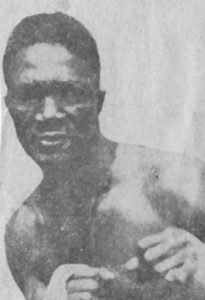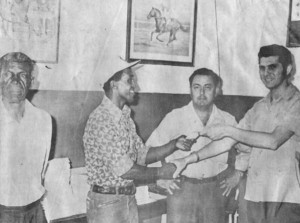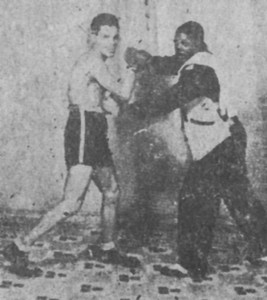By Eion Jardine
Today I look back at one of Guyana’s greatest boxing trainers. A man who survived boxing for five decades. An ambassador in his own right and a trainer of the highest rank in all West Indian and Latin American countries. He was one of the most popular Guyanese trainers. His name… ”Uncle Harold Mack.”
Mack started out as a boxer along with his two cousins the late Lionel Gibbs and cyclone `Pats’ Gibbs.

It did not take him too long to discover after playing gloves with Lionel (who, incidentally was the only Guyanese boxers to hold three national titles simultaneously, the welterweight, middleweight and light-heavyweight) that training was his bag and not boxing.
In 1930 he made his mark as a trainer in the corner of Gibbs, by now a boxing superstar and it was no surprise when Lennox Blackmore and Patrick Ford, who were later to unsuccessfully challenge for world titles, gravitated to Mack.
Mack was mostly known for his ability to take a fighter who had previously lost to another boxer and enable him to win the return bout so keen were his powers of observation.
In the 1940s Mack successfully trained such boxers as Joe Ralph, Harry Payne, Len Houston and young Jack Johnson to name a few.
He also took, the lightly regarded, Hilton Denny, father of the late Cleveland Denny and beat the ever popular Dewan Si ngh in a featherweight contest.
Mack also extended his training to Caribbean boxers and was instrumental in training a number of Trinidadian fighters who came here including `Fighting Bailey’ in the 1950s.

He produced a new breed of fighters such as Young Joe Louis, Lezland Gibbs and Fredo Simmons, (both nephews of Lionel Gibbs), Joe To-Joto Fernandes and Wilfredo Miro who knocked out the Guyana steam roller Calvin Garraway.
Mack reshuffled those fighters like a deck of cards taking one fighter and making him beat the other.
In the fourth decade, Mack produced one of the better scientific boxers in the history of Guyana in Lennox Beckles.
So successful was he during this decade, that after one victorious occasion, he was given not a motorcade but a shoulder-cade all the way from the British Guiana Cricket Club ground, Thomas Lands, to Charlestown.
Mack will be remembered as the man who took Fitzroy Whyte to the middleweight and then the heavyweight championship titles of Guyana.
This was the man who took former welterweight champion Beckles in hand when the tide turned against him.

It was this great trainer who swung the tide back in Beckles’s favour such as in his return bout with Bunny Grant.
From then all it was all Harold Mack and Beckles until the end when Beckles lost his welterweight title to Vernon Lewis.
Mack was a balanced trainer. One who could do it all from massaging to training.
He could, and did on occasions, perform the duties of a corner man.
In his fifth decade he ushered in the professional career of Blackmoore after only three amateur fights to his name – one win and two losses.
But Mack would have told you that it was not easy despite the fact that Blackmoore was always willing to learn and was never obstinate.
Mack had recalled that Blackmoore wanted to be a power puncher and had been concentrating on using his right hand only.
But Mack had other ideas and wanted his protégé to learn to jab.
One afternoon he strapped Blackmore’s right hand to his side and had him work his left hand jabbing at the speed ball.That cured him.He also launched Ford’s career.
Mack trained Ford from his very first fight up to when he became co-trainer with Chuck Talahami. Had it not been for his failing sight at the last minute of Ford’s preparation for his world title fight against Salvador Sanchez, Mack might even have gone to Mexico with him. Who knows? Ford might have won with Mack in his corner.
But Mack was still able to win two Commonwealth titles, one with Blackmoore in Nigeria on September 30, 1977 against Jonathan Dele and the second one with Ford on August 1, 1980 who beat another Nigerian Hogan Jimoh.
And, if maybe the half point that Beckles lost by in London on October 16 1967 to Johnny Cooke, had been given to Beckles, “Uncle Harold” might have won three Commonwealth titles. He also won several national titles with local boxers.
His first national title was in 1935 in Trinidad when Gibbs, (the father of national cricket Glendon Gibbs) defeated Jack Montelle for the West Indies welterweight title.
Gibbs also won the welterweight, /middleweight and light heavyweight titles of Guyana in 1926, 1935 and 1940.
Jack Johnson, middleweight and light heavyweight titles 1940 and 1946, Hilton Denny, featherweight 1947, Len Houston, welterweight title in 1947, Young Joe Louis, welterweight title in 1948, Calvin Garraway, welterweight title, 1951, Fitzroy Whyte, middle and heavyweight, 1960 and 1963, Beckles welterweight title, 1965, Blackmore lightweight title 1975, Ford featherweight title, 1978 were all won under Mack’s expert tuition.
What more can I say about the man. He was the best. There was one instance when a manager put it to one of our top trainers that he should have Mack accompany him. His word s were… ”The man will take glory away from me, man.”
This was the kind of respect other trainers had for “Uncle Harold.”
Not only did fighter fear him, but trainers also. With his sight going from day to day, his greatest battle was then to save it. He underwent an operation but in January of 1981 Mack passed away.
But he left behind memories of what it takes to be a world class trainer.





